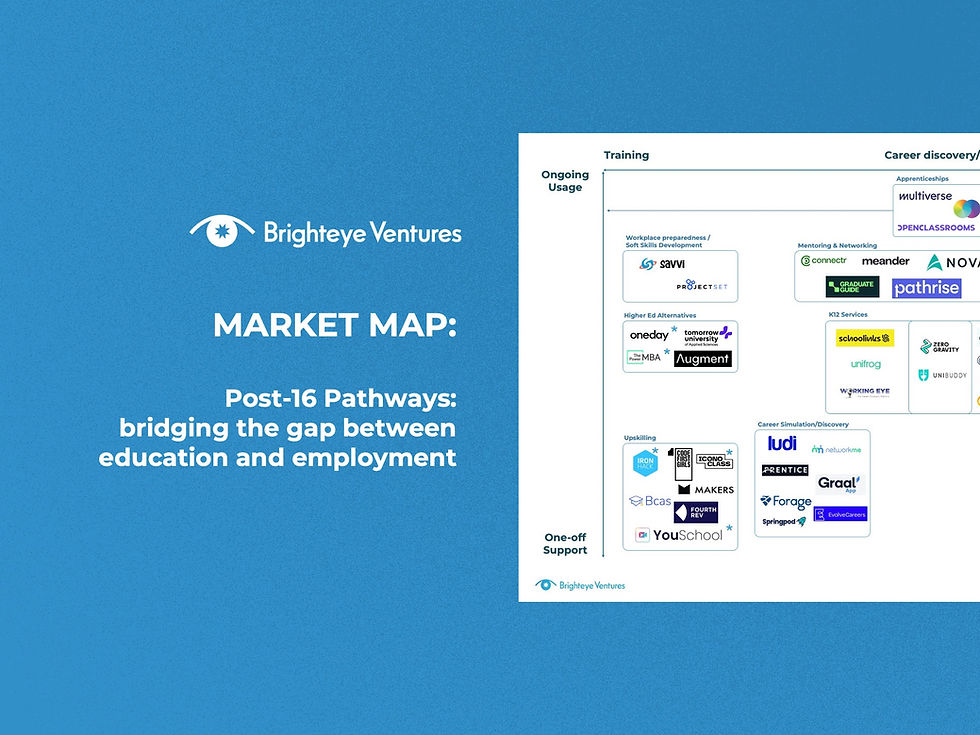Research Tools: breaching new frontiers
- rs1499
- Jul 24, 2025
- 3 min read
Scientific, technical & academic research tools
A report + market map
Research is a powerful driver of progress, helping us explore and understand the unknown, build new knowledge, and solve complex problems. For decades, it has relied on rigorous, often lengthy, time-consuming processes: reviewing literature, running experiments, gathering and interpreting data, publishing and peer reviewing results. These systems have built much of the world in which we live. However, we are observing a shift in the landscape and an emergence of new tools, which have the potential to reshape the ways in which we carry out research.
Advances in AI, automation, open science, and collaborative infrastructure are now reimagining how research gets done, not to replace the foundations, but to augment and accelerate them. Tasks that once took weeks or months can now be accomplished in hours. Tools powered by large language models (LLMs) are helping researchers, analysts, scientists, and strategists summarise information, generate hypotheses, and synthesise insights with unprecedented speed.
This transformation is not confined to academic institutions, we are seeing changes playing out across almost every industry, for example:
Life sciences, where AI is streamlining drug discovery, among other things
Materials science, where simulations reduce time to innovation
Legal and policy research, where AI copilots support precedent analysis and compliance tracking
Financial and commercial research, where insights are drawn from massive volumes of structured and unstructured data
Customer research, where interviews, feedback, and behaviour are being turned into insights at rapid pace
As research becomes faster, more collaborative, more computational, and more accessible, we’re also seeing the emergence of new markets, infrastructure layers, and models for value creation. The challenge ahead is ensuring that speed and scale don’t come at the cost of rigour, depth, or reproducibility.
This report sets the stage for the changing face of research as a whole, before zooming in on the tools and technologies transforming academic, scientific, and technical research, the domains where new knowledge is created and validated. We’ll explore the emerging solutions that are reshaping how novel research is designed, conducted, and communicated.
What are the headlines for this report?
Research is entering a new paradigm, where AI, automation of analysis and decentralised collaboration, amongst others, are transforming every step of the process from hypothesis generation to publishing.
LLMs are foundational to this shift, acting as copilots in scientific, academic, commercial, and legal domains. They are already enhancing how researchers search, synthesise, write, and predict.
Workflows are evolving from linear and siloed to continuous, integrated, and AI-augmented, enabled by cloud labs, data platforms, and simulation tools.
The infrastructure layer is still immature, creating openings for founders to build core platforms for knowledge management, reproducibility, and research collaboration.
Ethical challenges exist alongside capabilities, particularly around transparency, data governance, research bias, and the future role of the researcher.
Investors have an interesting opportunity to back the tools that will define the next era of discovery. There are many promising early-stage startups innovating in this field.
The market map

Segmentation:
Enablement: these solutions provide the administrative support or underlying infrastructure capabilities which a researcher uses in order to deliver their research.
Discovery: these are discovery tools support researchers with access to new or better quality information, or streamline the ways that researchers find this information.
Analytics: these tools support researchers with analysis , or simulations, helping them model and carry out new experimentation at pace.
-
In many cases companies span across multiple segments, so we have placed them in the segment in which we feel is most relevant.
Where are the opportunities?
Structured, usable data remains the biggest unlock
Research infrastructure is still fragmented & ripe for verticalised reinvention
LLM-native workflows are creating new UX standards in research
AI is compressing discovery cycles, but synthesis and scale-up remain broken
Clinical trials and real-world validation are under-optimised and under-served
AI-powered literature synthesis and insight generation is becoming critical
Vertical AI startups must focus on defensible niches or infrastructure plays
We flesh these out in more detail in the report... which can be accessed below.
👉 Explore the full report here! 👈



Comments